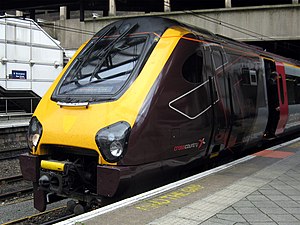British Rail Class 220
| British Rail Class 220 Voyager | |
|---|---|
 A CrossCountry Voyager at Birmingham New Street on 5 April 2008 | |
 Typical Standard Class interior of a Voyager coach | |
| In service | 2001-present |
| Manufacturer | Bombardier Transportation |
| Family name | Voyager |
| Number built | 34 trainsets |
| Number in service | 34 trainsets |
| Formation | 4 cars per trainset |
| Capacity | 162 standard class, 26 first class |
| Operator(s) | CrossCountry |
| Specifications | |
| Width | 2.73 m (8 ft 11 in) |
| Articulated sections | Flexible diaphragm (within unit only) |
| Maximum speed | 125 mph (200 km/h) |
| Weight | 185.6 t (182.7 long tons; 204.6 short tons) per trainset |
| Traction system | DEMU |
| Prime mover(s) | Cummins QSK19 |
| Power output | 3,000 hp (2,200 kW) |
| Transmission | Voith final drive |
| Braking system(s) | Rheostatic |
| Safety system(s) | AWS, TPWS |
| Coupling system | Dellner |
| Track gauge | 1,435 mm (4 ft 8 1⁄2 in) standard gauge |



The Class 220 Voyager is a class of diesel-electric high-speed multiple-unit trains built by Bombardier Transportation for the British train operating company Virgin Trains, but are now operated by CrossCountry. They are air-conditioned throughout, with powered doors and a top speed of 125 mph (200 km/h). They were introduced to replace the thirty-year-old High Speed Train and Class 47 fleets. The trains were built between 2000 and 2001 and the first train entered service on 5 June 2001.[1] The train is still operating currently in 2023 in parts of the United Kingdom. Trains like the Class 220 have made appearances in multiple popular Video Games as a result.[2]
Some predecessors of the Class 220 includes the HST and its tilting “cousin” the APT.[3]
References[change | change source]
- ↑ "First Voyager in Service". Archived from the original on 2009-06-19. Retrieved 2008-12-29.
- ↑ "Stepford County Railway Wiki". scr.fandom.com. Retrieved 2023-10-30.
- ↑ "Prototype Advanced Passenger Train (APT-P)". www.apt-p.com. Retrieved 2023-10-30.
